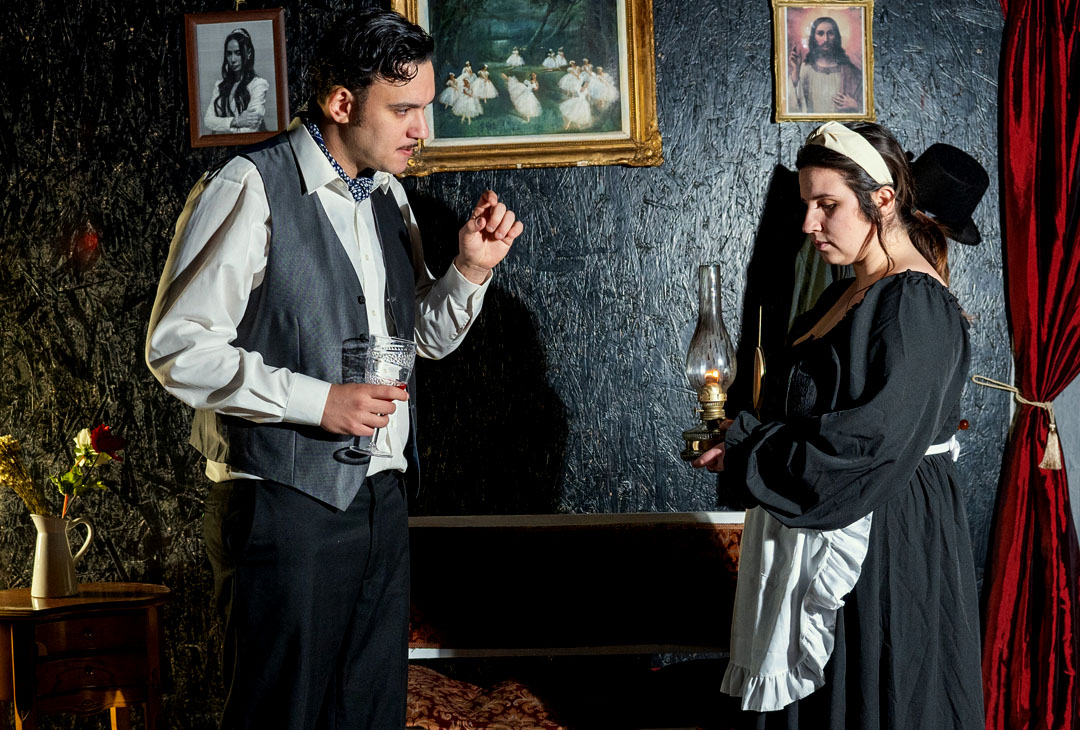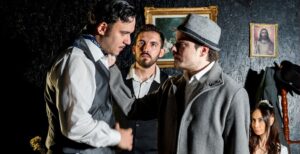ETERNAL HUSBAND

INTERVIEWS
KONSTANTINOS BALABANIDES
THE FRAGILE MECHANISM OF HUMAN CONSCIOUSNESS
Eternal husband: Eva Mara talks to Konstantinos Balabanides
«Many empires have fallen, but the theatre has been, is and will be.» The «Eternal husband» by Konstantinos Balabanides. The multi-talented, restless and promising, multi-faceted creator-artist Konstantinos Balabanides pleasantly surprises us anew with his stunning theatrical collaboration at Theatre 2510 with his dramatized psychograph of the iconic Dostoyevsky’s play-dramatized psychograph The «Eternal husband», directed by Christos Panoutsos, with his dual role in it, as theatrical arranger and protagonist. This is a movingly successful theatrical performance – adaptation by a creative visionary of art who likes difficult theatrical invitations and proposals, while he does not hesitate to take on the most demanding, iconic works of the world repertoire in which he incorporates his own contemporary view, without ever betraying the spirit of a classic work. In spite of the times, Konstantinos Balabanides leaves himself to the insurmountable power of art and expresses his truth, vigorously seeking to bring something different to the world of the theatre he serves with passion and vision, a theatre that will always remain timeless and topical, which is called upon to revive society, especially in times of crisis, but also to illuminate the darkness of our lives.
Eternal husband: The concept
When did your journey in the art of acting begin and what was the trigger for it? How would you define the concept of theatre as an artist-creator? How does the art of acting meet theatrical adaptation?
This journey, in the field of arts began around 2020 with the need – and we in turn – to give our intangible thoughts «flesh and blood». We started with short films and in 2023, with the same philosophy, we decided to bring to the theatre stage our favourite plays -which have not been performed or have not been performed for years-. All these years we have been researching, performing, directing, doing seminars so that we could become better on this part.
It’s a way to communicate, to show, something that can’t be said otherwise. An inner feeling, an invisible tension, a question without an answer. Theatre for me is not didactic, but contagious: It transmits inner vibrations, conflicts, doubts.
Acting and theatrical adaptation meet in a lively, creative dialogue. They are not two separate areas that just happen to meet by chance; on the contrary, one penetrates the other. One hand washes the other in short.

Eternal husband: The psychography
On the occasion of your interesting theatrical performance-dramatized psychography, The «Eternal husband», by Fyodor Dostoevsky, which is being successfully staged from 23/3 at the 2510 Theatre, we would like you to give us – in summary – the stamp of this play with your dual role in it (the adaptor and the protagonist), as well as your own role, the eternal husband or Paul Pavlovich Trusotsky!
Our show is not just an adaptation of The «Eternal husband», but a dive into the soul of a man in dissolution. We call it a dramatic psychogram, because we approach, another story of memory, guilt, and the need for redemption. In the adaptation, I kept the core of Dostoevsky’s play, but I emphasized the inner world of Paul Pavlovich, with the aim of highlighting not only his actions but why he does them. The role is deeply contradictory. Paul Pavlovich is a petty, vulnerable, passive man, and yet behind his apparent weakness lies an inner violence, a repressed rage and need for control.
Eternal husband: A mental condition
Who is the eternal husband after all? What were the difficulties involved in performing your lead role interpretatively? In the show you have successfully signed the stage adaptation. What degree of difficulty was involved in bringing an iconic 19th century classic novel into the present day by a young author? Did the end result do you justice? What challenges did you face as an adaptor of a structurally sound work?
The eternal husband is not just a cheating husband. It is a mental condition. He is a man who always lives through others, defined by relationships of power, guilt, and dependence. He is both a victim and a perpetrator, because his very passivity becomes at some point demanding, suffocating, threatening. Interpretatively, I also found it difficult that this hero does not develop dramatically in a visible way. The actor has to carry an invisible shift, a wear and tear that doesn’t scream but silently eats away at the face and body.
Yes, adapting an iconic 19th century novel today is challenging in many ways. The novel has an internal and psychological density. It is not easily dramatized. There is no clear plot, there are psychic fluctuations. I had to devise a theatrical structure without betraying the spirit of the work.

Eternal husband: The culture of Russia
How did you go about selecting this project? What is the interest-delight and importance of the classic work of the iconic playwright, Fyodor Dostoevsky?
I have always been fascinated by the culture of Russia and through discussions with a friend who recommended this writer to me, I got into Dostoevsky’s psyche. I would say that I was drawn to him by the subtlety with which he analyses the mental state of each character with the integrity of a psychologist. The «Eternal husband» and «Underground» were the first books I read with the former taking the first place in general in my heart. I loved Trusotsky and this was the trigger to adapt this play for the theatre, after consulting with the director of the play, Christos Panoutsos.
Eternal husband: Interpersonal issues
What issues are addressed in the play and what is the central message that permeates the theatre? How is the psychography of the play’s character-heroes portrayed on stage?
The «Eternal husband» addresses a number of profound existential, interpersonal and psychological issues that, although rooted in the 19th century, touch poignantly on the present day.
Dependence and loneliness, with the hero living through others. The need to be «somebody» always passes through a relationship. How many people today do not build themselves only through the approval of the other? The guilt and oppression through the heroes carry something that weighs them down, whether they say it or not. These are people who couldn’t speak up when they should have – and now it’s eating away at their insides.

Eternal husband: Switch emotions
How is the constant shifting of emotions by the actor-heroes in the play achieved?
The constant alternation of emotions is achieved through the deep connection of the actors on each role individually. Dostoevsky’s heroes do not «decide» to switch emotions but are carried away by their passions, memories, guilt and old, hidden fears. In the performance, we sought an interpretive line where the alternation is not superficial, but arises from every small change in the relationship between the characters.
What is your goal – your personal goal in the show?
My goal was to illuminate the fragile mechanism of human consciousness as captured by Dostoevsky. I sought to highlight the fine line between ridiculousness and tragedy, greatness and despair. But above all, I wanted the viewer to feel uncomfortable as if they were Pavel Pavlovich Trusotsky themselves.
Eternal husband: Get along
What is your personal vision in art as a young artist?
As a young artist I would like to bring something different to the world of theatre. Visuals that Greek society has never seen before or may have seen in the slightest. Through them I am initially becoming a better person because I learn through each play we perform. First I clash with the character in question, we «get along» and move on. That’s probably what any audience watching us admires. If I could, I would like to be a person who makes the audience, when they leave the theatre, reflect for even a few minutes on issues of existence, relationships and whatever the play in question demonstrates.
Eternal husband: The immeasurable power
In conclusion, can the theatre and by extension art listen to the SOS that our era is sending out today? What is its social mission and its role in times of generalized crisis, such as today?
Yes, it can and should. Theatre has an immeasurable power. Theatre gives you strength, makes you think, breaks you down to make you better. How many shows have we all seen that we will remember forever in our lives? How many shows have made us change for the better? In times of crisis, when societies sink into despair or apathy, theatre is called upon to reinvigorate society. Its mission is to remind you (past), to bear you (present) and to make you dream (future). Many empires have fallen but theatre has been, is and will be. This reasoning alone says it all.
Σχετικά άρθρα
-
 ΑΧΙΛΛΕΑΣ ΨΑΛΤΟΠΟΥΛΟΣ
ΑΧΙΛΛΕΑΣ ΨΑΛΤΟΠΟΥΛΟΣΙούλ 23, 2025 0
-
 ΚΩΝΣΤΑΝΤΙΝΟΣ...
ΚΩΝΣΤΑΝΤΙΝΟΣ...Απρ 30, 2025 0
-
 ΣΥΝΕΝΤΕΥΞΗ...
ΣΥΝΕΝΤΕΥΞΗ...Ιούλ 19, 2023 0
-

Στην ίδια κατηγορία
-

-
 ΛΑΜΠΕΡΑ ΠΑΡΑΣΙΤΑ
ΛΑΜΠΕΡΑ ΠΑΡΑΣΙΤΑΙαν 03, 2026 0
-
 Η ΑΝΘΡΩΠΙΝΗ ΦΩΝΗ
Η ΑΝΘΡΩΠΙΝΗ ΦΩΝΗΔεκ 26, 2025 0
-

Αναζήτηση
-
 WONDER WOMAN
WONDER WOMANΙούν 09, 2017 138
-
 ΠΑΙΔΙΚΗ ΣΚΗΝΗ
ΠΑΙΔΙΚΗ ΣΚΗΝΗΟκτ 12, 2014 2
-
 ΚΛΗΡΩΣΗ ΠΡΟΣΚΛΗΣΕΩΝ
ΚΛΗΡΩΣΗ ΠΡΟΣΚΛΗΣΕΩΝΜαρ 22, 2014 2
-
 ΔΥΟ ΜΕΡΕΣ, ΜΙΑ ΝΥΧΤΑ
ΔΥΟ ΜΕΡΕΣ, ΜΙΑ ΝΥΧΤΑΝοέ 13, 2014 2
-
 ΑΧΙΛΛΕΑΣ ΨΑΛΤΟΠΟΥΛΟΣ
ΑΧΙΛΛΕΑΣ ΨΑΛΤΟΠΟΥΛΟΣΝοέ 09, 2014 2
-
 ISTABUL FILM FESTIVAL
ISTABUL FILM FESTIVALΜαρ 08, 2014 2
-
 ΆΓΙΟΣ ΠΑΪΣΙΟΣ ΑΠΟ ΤΑ ΦΑΡΑΣΑ ΣΤΟΝ ΟΥΡΑΝΟ
ΆΓΙΟΣ ΠΑΪΣΙΟΣ ΑΠΟ ΤΑ ΦΑΡΑΣΑ ΣΤΟΝ ΟΥΡΑΝΟΙαν 31, 2026 0
-
 GHOST DOG Ο ΤΡΟΠΟΣ ΤΩΝ ΣΑΜΟΥΡΑΪ
GHOST DOG Ο ΤΡΟΠΟΣ ΤΩΝ ΣΑΜΟΥΡΑΪΙαν 31, 2026 0
-

-
 Η ΣΕΙΡΗΝΑ ΤΗΣ ΜΑΡΤΙΝΙΚΑ
Η ΣΕΙΡΗΝΑ ΤΗΣ ΜΑΡΤΙΝΙΚΑΙαν 30, 2026 0
-

-
 ΟΣΑ ΔΕΝ ΕΣΒΗΣΕ Ο ΑΝΕΜΟΣ
ΟΣΑ ΔΕΝ ΕΣΒΗΣΕ Ο ΑΝΕΜΟΣΙαν 30, 2026 0

Δείτε το τρέιλερ της ταινίας μας, που συμμετέχει το Φεστιβάλ Ντοκιμαντέρ Θεσσαλονίκης.
SOTOS, EVERLASTING PAINTER (TRAILER)
Youtube
Επικοινωνήστε
ΓΙΑΝΝΗΣ ΦΡΑΓΚΟΥΛΗΣ
Email: info@filmandtheater.gr
Τηλ: (+30) 6974123481
Διεύθυνση: Ιωαννίνων 2, 56430, Σταυρούπολη Θεσσαλονίκη
![]()

